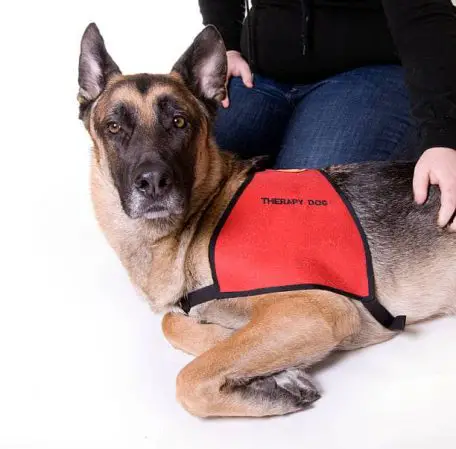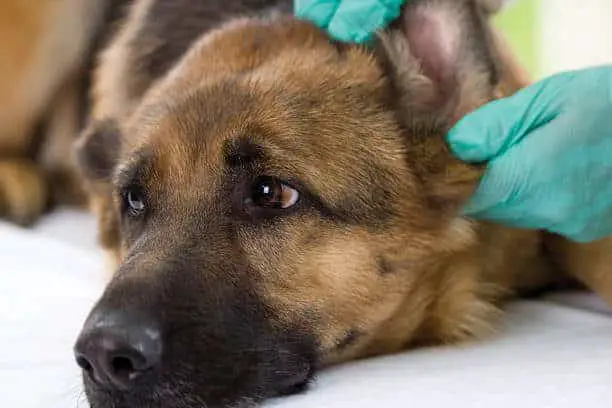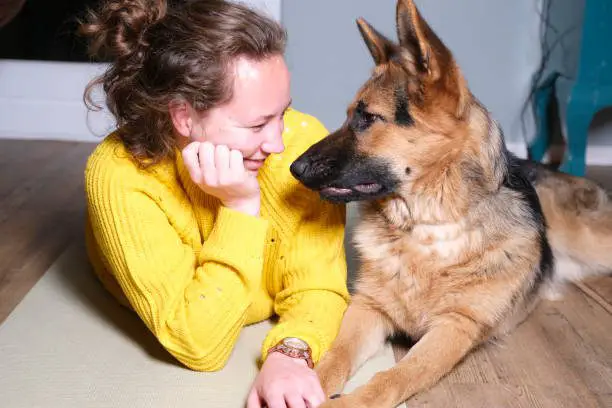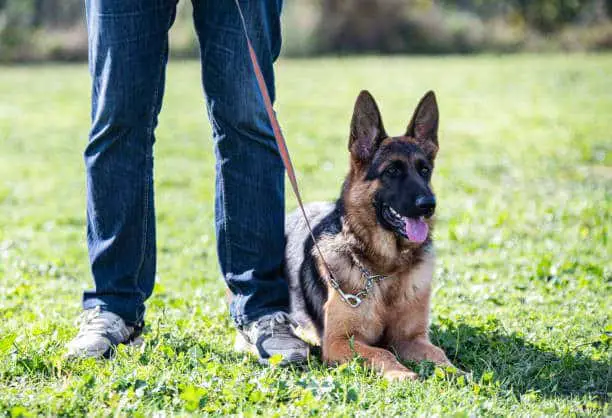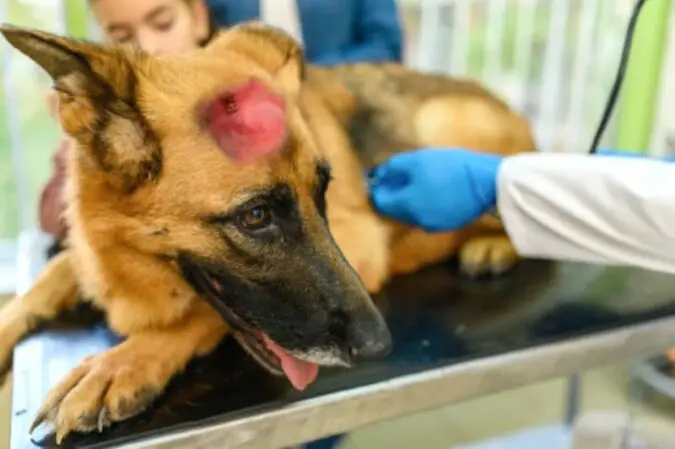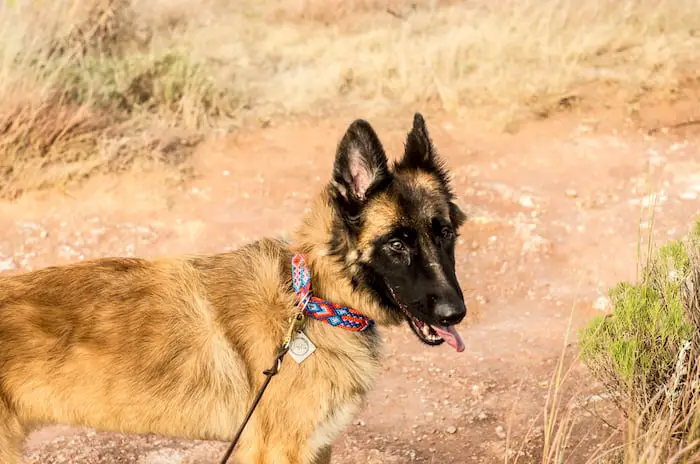German Shepherd Separation Anxiety and How To Deal With It
You’ve probably heard about German Shepherd separation anxiety if you own a German Shepherd.
When your dog’s separation anxiety comes, it means that he or she has a hard time being alone while you’re gone. It’s hard to be by yourself at home.
Dogs live in groups. This means that being alone for long periods of time is not natural for them.
Some types of dogs can be fine on their own for a few hours. One of them is the German Shepherd. But some breeds won’t be able to deal with it at all.
German Shepherds are calm and can handle being alone for a few hours, but they can still have German Shepherd separation anxiety.
If your German Shepherd acts up when you’re not around, you should know that it’s because it’s worried about you being gone. It is not misbehaving for a payback.
If that happens, you shouldn’t be so quick to punish or train your German Shepherd.
This will make it feel more worried and tense. Instead of seeing it as a bad thing, look at it as a chance to help the dog get better.
Science Direct says that owners who hit their dogs more make their dogs less playful and happy in general.
It also makes the dog less likely to trust you.
There are many things you can do to fix this and show your German Shepherd that you leaving is normal and fine.
Remember that any method will take time and will require patience and consistency.
On average, it takes anywhere from a few weeks to a few months for what you’ve learned to sink in.
How to help a German Shepherd with separation anxiety

Here are some things you can do to help your German Shepherd Separation anxiety.
• Get your German Shepherd to trust you.
Once you start practicing with your German Shepherd every day, you will start to help it feel better about being alone. Try doing two 5-minute sessions a day.
During these times, you should practice giving your dog simple commands.
Teach it to walk toward you, sit down, stay still, roll over, talk, and do many other things.
Don’t forget that any training you do should always make you feel good.
Don’t forget that your dog is a bit like your child.
If you give commands that are harsh and demanding, the dog will get scared and not want to keep going.
• Make the place nice and cozy.
It would be best if your dog had a place in the house where he or she could go to calm down. This area needs to be a
where the dog can feel comfortable and safe.
You can teach the dog a command that tells it when it is time to go to that place. When it does, you can give it a treat.
When the dog is in that spot, give it a lot of love.
You should even try to make this the place where you show it the most love and care while you are in training. This will remind it of a good time every time it goes to this place.
Give your German Shepherd love, but don’t give it to him when he’s trying to get it.
When the dog comes to you to be petted, don’t do it. Teach the dog that you, not the other way around, decide when it gets this kind of treatment.
This study suggests that you buy a toy or other device that makes noise to keep your dog busy or calm while you leave the room.
• Show the dog how to be on its own.

Most German Shepherds who are afraid of being alone will follow their owners wherever they go. This is the first thing your dog needs to stop doing.
This is a simple thing, which is why owners find it so hard to do.
But you have to keep in mind that this is the key to making the dog less worried when you leave.
Try to get the dog to stay down, and give it a treat every time it stays down for a minute longer than it did before.
Before you add minutes to how long it should stay down, try adding seconds.
Once the dog stays still, move farther away from it and come back before it starts to get worried.
Eventually, you’ll be able to leave the room once you’ve done this and increased the time and distance with each practice.
• Leave the dog alone for a while.
You should put your German Shepherd in a room or crate that you know it likes.
Close the door and only leave the room for a few seconds at a time. After that, try going from seconds to minutes.
Give the dog a toy or a treat that takes a while to eat to keep it from following you.
This will give you time to go back and forth. Once thirty minutes have passed, the dog should be used to being in the room by itself.
For now, you only give the dog the treat during the sessions.
Eating is a stress-relieving activity for dogs because it helps them to calm down.
If you can get the dog to like whatever you give it when you leave, it will get easier for it to forget about you after a while.
• Come in and go out quietly.
When you’re about to leave and your dog is freaking out, it can be tempting to try to calm it down.
Debra Horwitz says that this can actually worsen the German Shepherd Separation anxiety.
Web MD says that you should ignore your dog before you leave the house and when you come back.
Don’t say hello or goodbye to the dog. This will help it stay calm and in control when it is around you.
Before you leave and when you get home, try to ignore your dog for 15 minutes.
Some people don’t know how to tell when your dog is getting worried when you leave or come back.
If you see your German Shepherd whining, panting, or running around, this is a dead giveaway.
At first, it will be hard not to give in, but try your best not to comfort the dog while this is going on.
• Get in the habit of leaving signals
Make a list of everything you do right before you leave that scares the dog.
Most people take out their keys, put on their coats, or walk toward the door. These things make your German Shepherd nervous.
Every day, keep doing these things and wait for the dog to respond.
Do it more and more every day until it stops responding. When it’s no longer responding, you can move on to another action.
If you do these things, you don’t even have to leave your house to go somewhere. Try it just to go outside and back inside.
Conclusion: German Shepherd separation anxiety
The most important thing to remember is that you shouldn’t leave the dog alone for too long while you’re training it. Start with seconds and move to minutes.
During this training, don’t leave the dog alone for hours at a time.
All of your hard work will be undone, and you’ll find yourself right back where you began.
The American Veterinary Medical Association (AVMA) says you can also use a pheromone and let it out into the air to help the dog stay calm.
Try to find a daycare for the dog or hire a babysitter until you can finish training it.
If you can’t do that, try to keep the dog in a place where it can do the least amount of damage.
